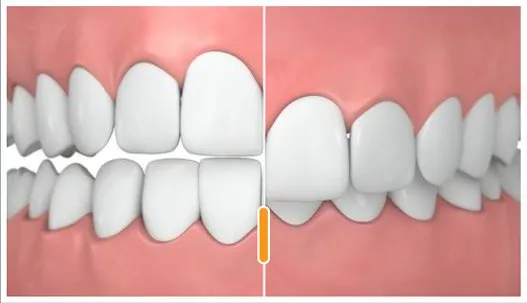The correlation between your overall health and your bite is a direct one because if your jaws and teeth are misplaced or not properly aligned then this may affect your physical health negatively. You may find it difficult to breathe, speak, and eat and your facial appearance as well as smile can also change.
Underbite:
Ideally, the upper teeth are supposed to be slightly above the lower front teeth and the lower front teeth should lie slightly behind the upper ones. Underbite occurs due to the overgrowth of your lower jaw and/or undergrowth of upper jaw, or it could be a mixture of both. When a person suffers from underbite, the lower teeth hang past the upper front teeth. As a result, tooth wear happens and the patient may feel pain in jaws and joints. Underbite doesn’t only affect the upper incisor teeth but also the molars and the patient’s lower jaw becomes much more prominent
It is important to have the underbite assessed as soon as it gets detected. The condition may worsen if not treated timely and if it becomes a skeletal issue from a dental one then surgery may be required to correct it
Overbite:
Overbite is a condition in which the upper teeth overlap the lower teeth. Normally, our upper teeth slightly overlap the lower ones and it occurs naturally. However, the normal range of this gap is between 3 to 5 millimeters. If the gap is greater than 5mm then this condition will be characterized as an overbite.
Extensive and prolonged use of a pacifier worsens the condition and so do habits like thumb sucking, tongue thrusting and/or breathing from the mouth.
Crossbite:
Crossbite is a condition that may involve a single tooth or multiple teeth. A crossbite is when the lower tooth overlap the upper tooth Usually, crossbites are directly related to the narrowness of upper jaw and it can occur in the front or any of the other sides of the mouth.
When crossbite happens, one or more teeth may start tilting either toward the cheek or towards the tongue. Either way, this tilting affects the alignment of other teeth and paves way for different oral health issues such as teeth wear, bone loss and gum diseases. It must be noted that crossbite may occur on one or both sides of the jaw. Due to this condition, the jaw bone becomes excessively burdened and comes under stress.
Crossbites are also hereditary in nature because the tooth and jaw bone shapes are governed by genes. However, crossbite may develop if the baby teeth loss is delayed or new teeth emerge abnormally. Habits like careless chewing style and thumb sucking worsen the condition.
Treatment:
Early orthodontic intervention may be required to shift teeth into an ideal position or to guide the growth of the jawbone If the condition is ignored surgery may be required. So, you must consult your dentist to consider the appropriate treatment and correct the abnormal growth or tilting of teeth.

